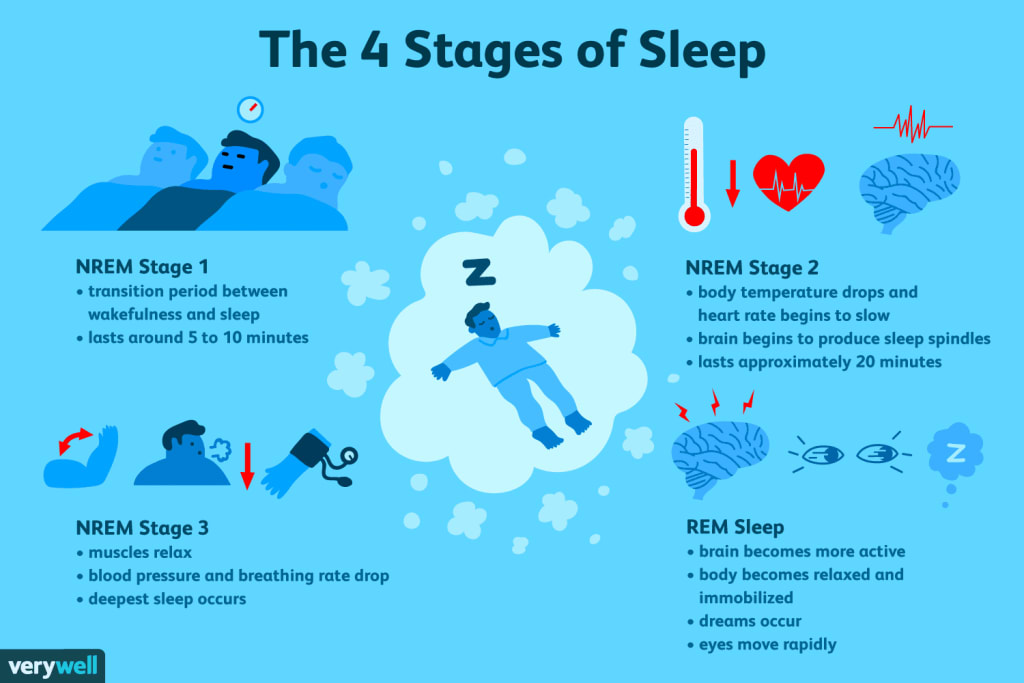Unlocking the Secrets of Sleep: Unveiling the Stages for Optimal Rest and Rejuvenation
Secrets of Sleep

Sleep is a complex physiological process that consists of multiple stages, each characterized by distinct patterns of brain activity, eye movements, and muscle tone. These stages can be broadly categorized into two main types: Non-rapid eye movement (NREM) sleep and rapid eye movement (REM) sleep. Let's explore each stage in more detail:
Stage 1 - NREM: This is the initial stage of sleep and is often considered a transition period between wakefulness and sleep. During this stage, brain waves start to slow down from the wakeful state. People in Stage 1 may experience drifting in and out of sleep, and they can be easily awakened. The muscle tone decreases, and occasional muscle contractions, called hypnic myoclonia, may occur. Stage 1 usually lasts for a few minutes.
Stage 2 - NREM: Stage 2 is a slightly deeper sleep stage compared to Stage 1. It makes up a significant portion of total sleep time. During this stage, brain waves continue to slow down, and sleep spindles and K-complexes may appear. Sleep spindles are short bursts of rapid brain activity, while K-complexes are sudden high-amplitude waves. These phenomena are thought to play a role in memory consolidation and protecting sleep from external stimuli.
Stage 3 - NREM: Also known as slow-wave sleep (SWS) or deep sleep, Stage 3 is characterized by slow brain waves called delta waves. It is during this stage that the body experiences profound rest and restoration. Deep sleep is essential for physical rejuvenation, immune function, and the release of growth hormone. It becomes progressively more difficult to wake someone up during this stage.
Stage 4 - NREM: Stage 4 is often grouped with Stage 3 as a combined NREM Stage 3 and 4. It is the deepest stage of NREM sleep, characterized by a predominance of delta waves. The body continues to undergo restorative processes, such as tissue repair, energy restoration, and strengthening of the immune system. Deep sleep is crucial for waking up feeling refreshed and maintaining overall well-being.
REM Sleep: Rapid eye movement (REM) sleep is a unique stage characterized by rapid and random eye movements, vivid dreaming, and high levels of brain activity. Despite the intense brain activity, the body experiences muscle paralysis, known as REM atonia, to prevent us from acting out our dreams. REM sleep is essential for cognitive processes, including learning, memory consolidation, and creativity. It is also associated with emotional regulation and the processing of complex emotions. During REM sleep, the brain consolidates and integrates information gathered throughout the day.
The sleep cycle consists of multiple cycles of NREM and REM sleep stages, typically lasting around 90 to 120 minutes. As the night progresses, the duration of REM sleep tends to increase, while the deep sleep stages (Stage 3 and 4) decrease. The first cycle of REM sleep usually occurs approximately 90 minutes after falling asleep, and subsequent cycles follow throughout the night, with each REM stage becoming longer in duration.
It's important to note that the duration and characteristics of sleep stages can vary among individuals and can be influenced by factors such as age, sleep disorders, and overall sleep quality. For example, infants spend a significant amount of time in REM sleep, while the proportion of deep sleep decreases with age.
Understanding the different stages of sleep helps us appreciate the complexity and significance of the sleep process in maintaining our physical and mental well-being. Each stage plays a unique role in our overall sleep architecture and contributes to various aspects of our health, including cognitive function, memory consolidation, emotional regulation, and physical restoration. A balanced and restful sleep that encompasses all stages is crucial for optimal health and well-being.
Sleep is a dynamic process that progresses through these stages in a cyclical manner throughout the night. This sleep cycle repetition allows for the necessary restoration and rejuvenation of the body and mind. The different stages of sleep are not only important individually but also work together to provide a comprehensive sleep experience. The NREM stages, particularly deep sleep (Stage 3 and 4), facilitate physical recovery, growth, and immune system functioning. REM sleep, on the other hand, supports cognitive functions, emotional processing, and memory consolidation. A healthy sleep cycle with an adequate amount of each stage is vital for promoting optimal physical, mental, and emotional well-being. Disruptions or imbalances in the sleep stages can lead to sleep disorders and have negative effects on various aspects of health and daily functioning. Therefore, prioritizing good sleep hygiene and ensuring sufficient time for each sleep stage can contribute to overall wellness and vitality.
About the Creator
Ajith Kumar
Good story teller about Sci-Fi, Adventure, thriller
Good in Pet Fishes and Pet Birds detailes
Good in General Facts






Comments
There are no comments for this story
Be the first to respond and start the conversation.